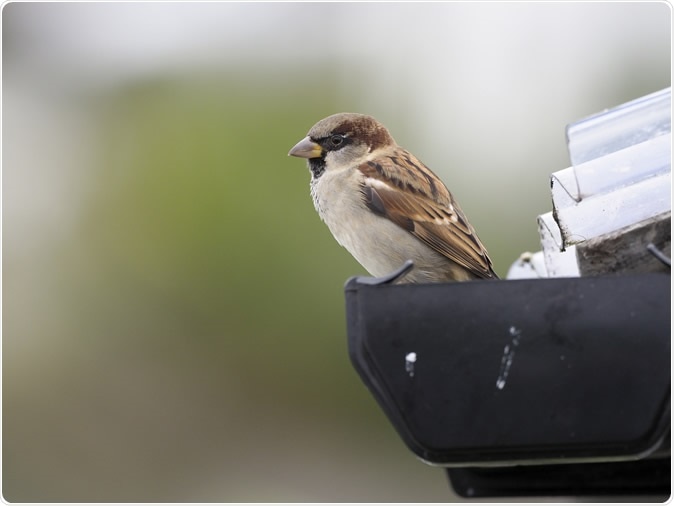
House sparrow, Passer domesticus. Image Credit: Erni / Shutterstock
Dopamine and stress
Dopamine is one of the brain’s neurotransmitters, a chemical that transmits information between neurons. It helps regulate attention, emotional responses, learning, memory, and movement. It also helps recognize reward and act to move toward them.
Even though dopamine is best known in reward-motivated behavior, two major pathways of the dopaminergic system also respond to stress. While many catecholaminergic systems are stimulated by stressful stimuli, the mesoprefrontal dopamine system is also vulnerable to stress, including the nigrostriatal dopamine pathway.
Dopamine is also imperative in responding to long-lasting stressors, the researchers found while analyzing data from wild songbirds.
“Although a rise in dopamine may be important for learning about and responding appropriately to threats, laboratory animal and human studies suggest that neurobiological mechanisms limiting the extent and duration of dopamine effects on the brain may contribute to stress resilience,” the researchers explained in the study.
The results of the study, which was published in the Scientific Reports, can help in wildlife conservation efforts as a result of environmental stressors, including extreme weather events, increase in predation, natural disasters, climate change, and habitat destruction.
Positron Emission Tomography (PET) scan for songbirds
The researchers used Positron Emission Tomography (PET) scan, which is commonly used in humans only, to determine and measure dopamine receptors in house sparrows. PET scan is commonly used in humans, but rarely on wild animals.
"This study is exciting because it is the first time PET scans have been used in wildlife to quantify dopamine receptors in the brain,” Professor Christine Lattin, Biological Sciences Assistant, said.
“Developing this technique has opened the door to being able to scan animals and release them back into the wild. We need to know how these wild birds are coping with stressors and responding to changes to the environment so we can understand how to best protect them,” she added.
Birds become resilient to stress over time
Aside from biomedical imaging, the researchers followed the birds and tracked their body mass and hormone levels. Also, they used a remotely operated video camera to analyze the birds’ response to captivity for over one month. They scanned the birds after they were brought into the laboratory and then scanned them again a month after. The researchers studied how the stress of captivity influenced the birds in the long run, using PET scans.
“We found that individuals that coped better with captivity (fewer anxiety-related behaviors, more time spent feeding, higher body mass) had a lower baseline and higher stress-induced corticosteroid titers at capture,” the researchers wrote in the study.
On the other hand, birds with higher striatal D2 receptor binding spent more time feeding in captivity but has a lower weight, than the birds with lower D2 receptor binding.
The findings of the study have shown that one type of dopamine receptor lowers overtime during captivity, suggesting that birds became less resilient to stress in the long run. The bigger the reduction in dopamine receptors, the more they manifested anxiety-related behaviors like feather-ruffling and body mass decrease.
"These physiological, neurobiological and behavioral changes suggest that songbirds are not able to habituate to captivity, at least over short periods of time. It is very important that scientists studying stress in wildlife find more ways to study them in their natural habitat," Lattin explained.
The results of the study, though conducted in wild songbirds, can give an insight on stress resilience in humans, too. Stress is a part of life, especially because everything is fast-paced today. Studying how humans and animals respond to stress over time is important in formulating preventive measures as well as treatment approaches for stress-related disorders, including anxiety and depression.
Journal reference:
Lattin, C., Merullo, D., Riters, L., and Carson, R. (2019). 'In vivo imaging of D2 receptors and corticosteroids predict behavioural responses to captivity stress in a wild bird'. Scientific Reports. DOI: 10.1038/s41598-019-46845-x
ID, https://www.nature.com/articles/s41598-019-46845-x